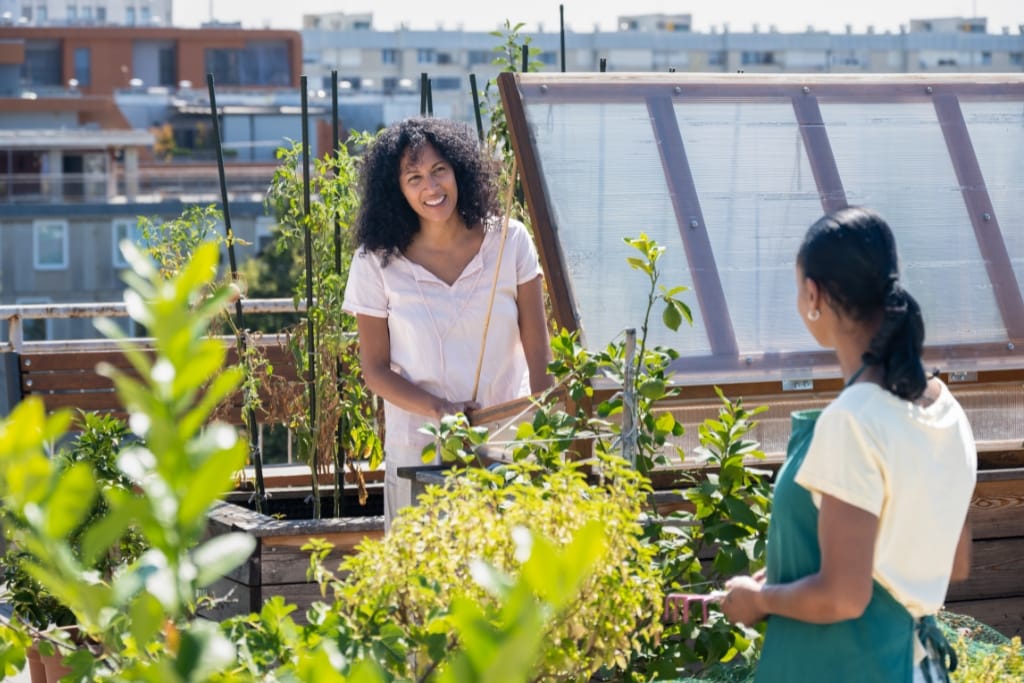Urban farming represents a powerful step towards creating healthier, more sustainable urban spaces for everyone.
By using even the smallest areas—balconies, rooftops, or community plots—people can grow their vegetables, fruits, and herbs, leading to better nutrition and fresher meals.
Beyond the personal benefits, urban farming strengthens neighborhoods, bringing people together to share knowledge, resources, and a common purpose.
It also combats pressing environmental challenges, including reducing food miles, lowering greenhouse gas emissions, and providing vital green spaces that improve air quality and support local wildlife.
Whether you’re new to gardening or a seasoned grower, urban farming offers opportunities to reconnect with nature and live more intentionally.
Take the first step and learn how urban farming can make a transformative difference for you and your community.
1)) Fresh, Local Produce
Growing your food through urban farming guarantees access to the freshest, most flavorful produce right at your doorstep.
Harvesting fruits and vegetables at their peak ripeness preserves their nutrients, providing you with healthier meals compared to store-bought alternatives often picked prematurely for transport.
Cultivating produce locally eliminates the need for long supply chains, ensuring your food hasn’t traveled hundreds of miles before reaching your plate.
The vibrant colors, natural flavors, and superior quality of homegrown crops are unparalleled, enriching your meals and inspiring a deeper appreciation for what you eat.
By focusing on growing your own fresh, local produce, you can enjoy better nutrition while making a positive impact on your health and the environment.
2)) Cost Savings On Food
Growing your food can significantly reduce your grocery bills while offering superior quality and freshness.
Urban farming allows you to produce fruits, vegetables, and herbs at a fraction of the cost you’d pay in stores, especially for organic options.
With a little planning and effort, you can create a steady supply of seasonal produce, drastically cutting down on your food expenses.
Beyond savings, it minimizes the hidden costs often passed on in retail prices, such as transportation, packaging, and distribution.
Over time, small-scale urban farming can yield big financial benefits, freeing up resources for other priorities while ensuring that you and your family have access to healthy, delicious food every day.
3)) Improved Health And Nutrition
Growing your food through urban farming leads to substantial improvements in health and nutrition by providing a direct source of fresh, wholesome ingredients.
Homegrown produce often contains higher nutrient levels than store-bought options, as it can be harvested at peak ripeness and consumed immediately.
This means you can enjoy fruits and vegetables packed with essential vitamins and minerals, free from the preservatives and chemicals often used in commercial farming.
Furthermore, eating fresh, unprocessed food supports better digestion, boosts immunity, and promotes overall well-being.
Urban farming also encourages healthier eating habits, as having easy access to a variety of fresh ingredients motivates individuals to cook more nutritious meals at home.
By taking control of what goes into your food, you reduce dependency on processed and packaged products, contributing to a longer, healthier life.
4)) Environmental Sustainability
Urban farming plays a vital role in promoting environmental sustainability by addressing critical ecological challenges within cities.
By growing food locally, urban farms drastically reduce the environmental impact of long supply chains, including the carbon emissions generated by transportation and packaging.
Cultivating green spaces in urban areas improves air quality and reduces the heat island effect, where dense city environments tend to retain excess heat.
Urban farms also encourage the use of sustainable practices, such as composting food waste to enrich the soil and conserving water through efficient irrigation systems.
These practices not only reduce waste but also reinforce the importance of responsible resource management.
Importantly, urban farming supports biodiversity by providing habitats for pollinators like bees and butterflies, which are crucial to healthy ecosystems.
Together, these efforts make urban farming a powerful tool for creating more resilient and sustainable communities.
5)) Supports Pollinators
Urban farming significantly contributes to supporting pollinator populations, which are essential for maintaining healthy ecosystems and ensuring food security.
By creating diverse green spaces filled with flowering plants, fruits, and vegetables, urban farms provide vital habitats and feeding grounds for bees, butterflies, hummingbirds, and other pollinators.
These creatures play a critical role in the pollination process, enabling the production of many crops and flowering plants.
However, urbanization and pesticide use have threatened their survival in recent years. Urban farms serve as safe havens where pollinators can thrive in chemical-free environments.
Planting a variety of pollinator-friendly species not only enhances the yield of your crops but also promotes biodiversity and the overall health of the urban ecosystem.
Supporting pollinators through urban farming ensures that these invaluable species continue to play their part in sustaining life and food production for generations to come.
6)) Reduces Food Transportation
Urban farming dramatically reduces the need for long-distance food transportation, which has a significant environmental and economic impact.
By growing food locally, cities can cut down on the extensive use of fossil fuels required to transport goods from farms to urban markets.
This not only minimizes greenhouse gas emissions but also decreases the reliance on large-scale industrial agriculture, which often prioritizes quantity over quality.
Reducing transportation also helps to preserve the freshness and nutritional value of produce, as food doesn’t have to endure long hauls and extended storage periods before reaching consumers.
Furthermore, shorter supply chains translate into less packaging waste, as locally grown food often requires minimal or no packaging.
These benefits collectively make urban farming a key solution for creating a more sustainable, efficient, and resilient food system, while fostering a closer connection between communities and the food they consume.
7)) Builds Community Connections
Urban farming fosters strong community connections by creating shared spaces where people can collaborate, learn, and grow together.
Community gardens and urban farms serve as hubs where individuals from diverse backgrounds can unite over a common goal—producing fresh, sustainable food.
These spaces encourage teamwork and interaction, cultivating friendships and strengthening neighborhood bonds.
Urban farming also provides education opportunities, allowing community members to share knowledge about sustainable practices, nutrition, and food production.
By participating in these collective efforts, individuals feel a sense of belonging and pride in contributing to their community’s well-being.
Urban farms often host events, workshops, and markets, which bring people together and create vibrant, engaging environments.
The sense of unity and purpose that emerges from these activities enhances social cohesion and creates resilient communities that are better equipped to face environmental and social challenges.
Through urban farming, connections flourish, transforming neighborhoods into thriving networks of cooperation and mutual support.
8)) Promotes Self-Sufficiency
Urban farming empowers individuals and communities by promoting self-sufficiency and reducing reliance on external food systems.
By growing their fruits, vegetables, and herbs, people can take control of their food supply and ensure access to fresh, nutritious produce.
This practice is particularly impactful in food deserts, where access to affordable and healthy options is limited.
Urban farming teaches valuable skills like planting, harvesting, and resource management, enabling people to produce food sustainably.
It reduces household expenses by cutting grocery costs while fostering a deeper understanding of where food comes from and the effort that goes into its cultivation.
On a broader scale, self-sufficient communities are more resilient to disruptions in global food systems, such as supply chain breakdowns or price surges.
The independence facilitated by urban farming not only improves food security but also instills a sense of pride and accomplishment, inspiring individuals to play an active role in shaping a healthier and more sustainable future.
9)) Educational Opportunities
Urban farming provides exceptional educational opportunities for people of all ages, fostering environmental awareness and a deeper understanding of sustainable living.
By engaging in hands-on activities like planting, composting, and harvesting, participants gain practical knowledge about food systems, soil health, and ecological balance.
Schools and community programs often use urban farms as living classrooms, teaching students about biology, agriculture, and nutrition dynamically and interactively.
These experiences help cultivate a sense of responsibility toward the environment and inspire future generations to adopt eco-friendly practices.
Urban farming workshops and training sessions empower individuals with skills that can be applied at home or in larger-scale farming projects.
Education through urban farming not only enhances individual capabilities but also builds collective awareness about global issues like food security and climate change.
The knowledge shared within these spaces inspires positive change and encourages communities to work together toward a more sustainable and informed future.
10)) Enhances Urban Green Spaces
Urban farming plays a crucial role in enhancing urban green spaces, transforming unused or neglected areas into vibrant, productive landscapes.
These green spaces provide much-needed relief in densely populated cities, improving air quality by increasing vegetation and reducing carbon dioxide levels.
Urban farms and gardens add aesthetic value to communities, replacing concrete lots or vacant plots with lush greenery and thriving ecosystems.
They serve as habitats for pollinators like bees and butterflies, contributing to biodiversity in urban environments.
Beyond environmental benefits, these spaces offer residents a place to relax, engage with nature, and escape the stresses of city life.
Urban green spaces created through farming also help mitigate the urban heat island effect, as plants provide shade and reduce surface temperatures, making cities cooler and more comfortable.
By integrating agriculture into urban landscapes, urban farming not only revitalizes city spaces but also fosters a deeper connection between people and the environment, creating healthier and more livable urban communities.
Conclusion
Urban farming serves as a powerful catalyst for positive change in modern cities, addressing critical challenges such as food security, environmental degradation, and social disconnection.
By transforming vacant spaces into productive hubs of activity and growth, urban farming fosters collaboration, education, and self-sufficiency while enhancing the quality of life for residents.
These initiatives create opportunities for individuals and communities to connect with nature, learn sustainable practices, and take ownership of their food systems.
Beyond food production, urban farms breathe life into urban environments by supporting biodiversity, reducing carbon footprints, and beautifying neighborhoods.
The collective impact of these efforts extends far beyond the immediate benefits, nurturing resilient, engaged communities that are better prepared to face future challenges.
Through creativity, dedication, and shared purpose, urban farming represents a meaningful step toward building sustainable, inclusive, and thriving cities for generations to come.
Download Our Free E-book!







